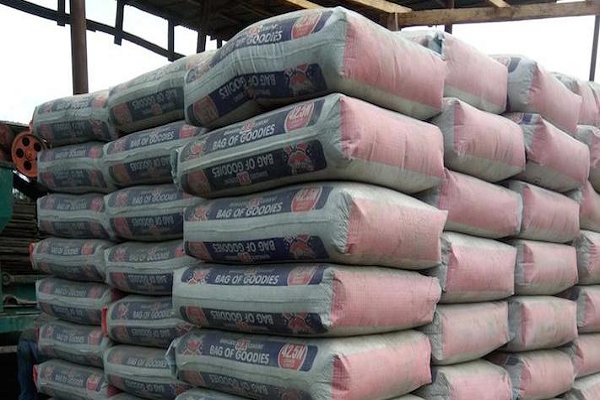The Nigerian government has threatened to allow importers to flood the country with foreign-made cement if Nigerian manufacturers refuse to reduce the price of the product.
Minister of Housing and Urban Development, Arc Ahmed Dangiwa, who made the declaration said key input materials for cement production such as limestone, clay, silica sand, and gypsum sourced within our borders, should not be dollar-rated.
Dangiwa made this known on Tuesday, February 20, in Abuja at an emergency meeting held with cement and building materials manufacturers.
He said the price of gas that manufacturers are using as an excuse should not be because gas is a raw material found within the country and the excuse of an increase in mining equipment should not come up because equipment bought by these manufacturers has been used for decades and not just purchased every day.
The minister said the border was closed to the importation of cement to help local manufacturers but if the government decides to open it back for mass importation, prices of cement would crash and local manufacturers would be gravely affected.
Dangiwa who called on the manufacturers to be more patriotic said BUA cement for instance has been willing and is still willing as at the last time he spoke with them to crash the price of their cement, lower than the N7000, N8000 agreed by the manufacturers and he sees no reason why the others should not do same.
The minister in response to the manufacturers said: “The challenges you speak of, many countries are facing the same challenges and some even worse than that but as patriotic citizens, we have to rally around whenever there is a crisis to change the situation.
“The gas price you spoke of, we know that we produce gas in the country. The only thing you can say is that maybe it is not enough. Even if you say about 50 percent of your production cost is spent on gas prices, we still produce gas in Nigeria it’s just that some of the manufacturers take advantage of the situation. As for the mining equipment that you mentioned, you buy equipment and it takes years and you are still using it.
“The time you bought it maybe it was at a lower price but because now the dollar is high you are using it as an excuse. Honestly, we have to sit down and look at this critically. The demand and supply should be good for you because the government stopped the importation of cement, they stopped the importation in order to empower you to produce more.
“Otherwise if the government opens the border for mass importation of cement, the price would crash but you would have no business to do and at the same time the employment generation would go down. So these are the kinds of things you have to look at, the efforts of government in ensuring things go well.”
Earlier in his speech, Group Chief Commercial Officer of Dangote Cement, Rabiu Umar blamed the high cost of gas and mining equipment for the hike in cement price.
He said: “It is safe to say we are all Nigerians and we are all facing the current head weight that is happening. I would like to speak on the popular belief that most of the raw materials to produce cement are available locally. While we have limestone and in some cases, we have gypsum and some cases coal, the reality is that it takes a lot of forex-related items to produce cement.
“Most of the cement plants in Nigeria use gas to produce, the gas is indexed to a dollar and it is almost half of the total cost of production. So if 50 percent of your cost of production is indexed to the dollar it means if the dollar changes then your total expenditure would change in that direction.
“For us to mine the limestone, one needs to import the mining equipment and the equipment is a substantial part of the cost of production, you have to invest in a lot of those equipment and invest in keeping them going. On the issue of the gas, we also have the issue of the quantity of gas, we are not getting enough gas to produce enough to put into the market then we talk about the price and quality of the gas because they are all related.
“Regarding what is happening at the border towns because of the devaluation of the naira it has made it a lot more attractive for people to come from neighbouring countries, with foreign exchange, buy cement and export it illegally across the border, of course, what that has done is demand has increased meaning that available stock in the country has reduced and that has put a lot of pressure on the prices.”
The minister also put the blame on the Cement Manufacturers of Nigeria for not regulating the price of cement in the country because earlier, the Executive Secretary of the Association, Salako James had informed the minister that the association does not discuss or determine the price of individual companies but are only made aware of prices from the market like every Nigerian.
Dangiwa said the ministry would be setting up a committee which would be comprised of representatives of each cement manufacturer in the country, its association, and the government to fashion out modalities to resolve the problem of high price of cement in the country.








More Stories
Teenager in viral photo of Obi’s 2023 presidential campaign rally, Alabi Quadri languishes in jail
Ribadu tells families of kidnapped victims not to pay any ransom
Ozigbo rejects Anambra APC guber primary, calls it a theft